If a few words had to provide a picture of the fifties they might be . . . optimism and anxiety. High hopes, deep fears.
The future did look bright, except for that lingering doubt about nuclear destruction. It was the time of the Cold War. Backyard bomb shelters were no novelty (at least in the United States). The Space Age began. Camelot 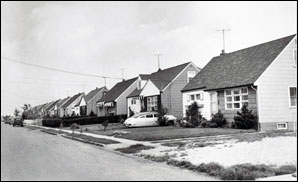 played in the White House. Suburban development (that's Levittown, NY at left) began to change the face of North American cities and the nearby countryside. Jackie Robinson brought great talent and a new colour to major league baseball but the march to equality outside the ballpark was slow and tortuous.
played in the White House. Suburban development (that's Levittown, NY at left) began to change the face of North American cities and the nearby countryside. Jackie Robinson brought great talent and a new colour to major league baseball but the march to equality outside the ballpark was slow and tortuous. 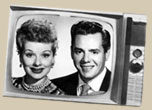 Television began to exert its enormous influence on our lives. Then came rock 'n roll. Elvis. Tail fins. In Canada, a buck was still a buck (not .68 cents American). It was quite a time.
Television began to exert its enormous influence on our lives. Then came rock 'n roll. Elvis. Tail fins. In Canada, a buck was still a buck (not .68 cents American). It was quite a time.
The decade had a dark beginning. War. Floods. In the summer of 1950 the Korean War started as North Korea invaded the South. It would last until 1953. In Western Canada, thousands of Winnipeg residents were forced from their homes as the Red River overflowed its banks and flooded the Manitoba capital. The Cleveland Browns began a string of seven straight Eastern Division NFL titles. Philadelphia's Whiz Kids won the NL, their first pennant in 35 years. Spahn and Bickford and Sain and pray for rain. Warren Spahn won 21, Johnny Sain 20 and Vern Bickford 19 for the Boston Braves. Club Med was first established in Alcudia on the Spanish island of Majorca.
1951 was a remarkable year. At the end of winter, Toronto's Bill Barilko scored the winning goal in overtime as the Maple Leafs won the Stanley Cup over Montreal. It was Barilko's last game. He was killed in a plane crash. In the spring, Willie Mays first suited up for the New York Giants. He was 20. "The Giants win the pennant, the Giants win the pennant, the Giants win the pennant . . . ". 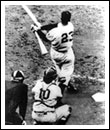 Oh yes, in October, the Giants' Bobby Thomson belted a 9th inning homer off Brooklyn's Ralph Branca (who wore uniform number 13) and New York came back from 13 1/2 games out to win. In December, Joe DiMaggio announced his retirement. In between, some beginnings -- in the summer of '51, J.D. Salinger's novel, "The Catcher in the Rye," was first published; "I Love Lucy" premiered on CBS and proved to be a television mainstay for ten years; Beckett's "Waiting for Godot" was first produced in Paris; in England, Winston Churchill was back as Prime Minister; back-yard bomb shelters became a phenomenon across America. In one of Bill Veeck's most famous stunts he brought 3 foot 7 inch Eddie Gaedel to the plate for the St. Louis Browns. Three of Cleveland's superb starting four had at least 20 wins. Bob Feller with 22, Mike Garcia and Early Wynn with 20. Bob Lemon had 17.
Oh yes, in October, the Giants' Bobby Thomson belted a 9th inning homer off Brooklyn's Ralph Branca (who wore uniform number 13) and New York came back from 13 1/2 games out to win. In December, Joe DiMaggio announced his retirement. In between, some beginnings -- in the summer of '51, J.D. Salinger's novel, "The Catcher in the Rye," was first published; "I Love Lucy" premiered on CBS and proved to be a television mainstay for ten years; Beckett's "Waiting for Godot" was first produced in Paris; in England, Winston Churchill was back as Prime Minister; back-yard bomb shelters became a phenomenon across America. In one of Bill Veeck's most famous stunts he brought 3 foot 7 inch Eddie Gaedel to the plate for the St. Louis Browns. Three of Cleveland's superb starting four had at least 20 wins. Bob Feller with 22, Mike Garcia and Early Wynn with 20. Bob Lemon had 17.
1952 had barely begun when bold headlines announced the death of Britain's King George VI. His daughter, Elizabeth II succeeded him. Minor leaguer Ron Necciai set the standard for strikeouts -- 27 Ks over 9 innings. Argentina's first lady, Eva Peron, died in Buenos Aires. She was just 33. Television came to Canada with the September debut of CBC TV. The first issue of Mad Magazine hit the newsstands. Dwight D. Eisenhower was elected American president. Ernest Hemingway's "The Old Man and the Sea" was published. John Steinbeck wrote "East of Eden". The first toy advertisement appeared on television. Viewers saw an ad for Mr. Potato Head. High rise architecture began with Le Corbusier's "towers in the sky" in Marseilles, France. The Nobel Peace Prize was awarded to Dr. Albert Schweitzer. The first Holiday Inn opened its doors in Memphis, Tennessee. In Australia Rupert Murdoch inherited two fledgling newspapers in Adelaide. Maureen Connolly of the United States would win the first of three consecutive Women's singles titles at Wimbledon. In the World Series, the Dodgers again lost to the Yankees.
Baseball's first big news in 1953 was the move of the Boston Braves to Milwaukee (and the construction of County Stadium). In Hollywood, the Academy Awards show was on television for the first time. The BIG news was in medicine. Dr. Jonas Salk announced the successful test of a vaccine against polio. Edmund Hillary and Tensing Norgay climbed Mount Everest. Queen Elizabeth II was crowned in Westminster Abbey. Fidel Castro began his campaign to oust Batista in Cuba. Castro's revolution would succeed six years later. James Baldwin published "Go Tell It on the Mountain". The James Bond series began with Ian Fleming's first Bond book, "Casino Royale". Raymond Chandler wrote "The Long Goodbye". Joseph Heller began writing "Catch-22". It was published eight years later. We were introduced to the "beat generation". Jack  Kerouac wrote "The Subterraneans". The US got colour television. The shock on the magazine rack was the introduction of Playboy. Marilyn Monroe was the first cover girl (Monroe would marry Joe DiMaggio in 1954). The first American sports car hit the road -- the two-seater Corvette from General Motors. There was a major breakthrough in science as Watson and Crick discovered the structure of DNA. Nikita Khrushchev came to power in the Soviet Union. The best college football player choose the Canadian Football League. Billy Vessels, the winner of the Heisman Trophy, turned down an offer from Baltimore (apparently, $6,500) to sign with the Edmonton Eskimos. He was one of several number one draft choices to opt for the Canada. Dodgers-Yankees in the World Series. Brooklyn didn't win.
Kerouac wrote "The Subterraneans". The US got colour television. The shock on the magazine rack was the introduction of Playboy. Marilyn Monroe was the first cover girl (Monroe would marry Joe DiMaggio in 1954). The first American sports car hit the road -- the two-seater Corvette from General Motors. There was a major breakthrough in science as Watson and Crick discovered the structure of DNA. Nikita Khrushchev came to power in the Soviet Union. The best college football player choose the Canadian Football League. Billy Vessels, the winner of the Heisman Trophy, turned down an offer from Baltimore (apparently, $6,500) to sign with the Edmonton Eskimos. He was one of several number one draft choices to opt for the Canada. Dodgers-Yankees in the World Series. Brooklyn didn't win.
Just two days before the 1954 season began, the U.S. Supreme Court ruled in Brown vs. The Board of Education of Topeka that it was illegal to have segregated schools. Rock 'n' Roll was just around the corner. But, the hit song in '54 was Sh-Boom by the Crew Cuts. Oh what a celebrity couple! In January, 1954 Joe DiMaggio married Marilyn Monroe in San Francisco. The first mass inoculation against polio with the Salk vaccine began in Pittsburgh. The Viet Minh's assault on Dien Bien Phu in Saigon was the beginning of the end for the French in Southeast Asia, and a mark on the timeline of the Vietnam War. Canada got its first subway as the Yonge Street line opened in Toronto. On April 23rd, 1954 Milwaukee beat St. Louis 7-5. A kid by the name of Hank Aaron hit his first major league homer. It was the year of the first sub four minute mile. England's Roger Bannister ran the first in a (then) astonishing 3:59:4. Australian John Landy beat the record a few weeks later. 3:57:9. Bannister and Landy met in the Commonwealth Games in Vancouver in August, 1954. Bannister won as both broke the four minute barrier. In minor league baseball, Joe Bauman of the Roswell team in the Class C Longhorn 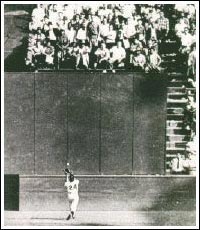 League hit 72 homers, an all-time record for organized baseball. Willie Mays of the New York Giants, won the NL batting title with a .345 average. The Giants met Cleveland (which had won a record 111 games) in the World Series. It's a fall classic remembered for Mays' amazing catch of a Vic Wertz drive in the opening game of the series (right). Jean Beliveau made his National Hockey League debut with Montreal. The St. Louis Browns went under. They became the Baltimore Orioles. Marilyn Bell became the first person to swim across Lake Ontario. In the summer of '54 in Cleveland, .a killing, and subsequent claim of innocence by Dr. Sam Sheppard, inspired the TV series "The Fugitive". In the middle of Lloydminster's first baseball season, Elvis Presley's first commercial recording session took place in Memphis. Presley's recorded "That's All Right (Mama)". The first issue of Sports Illustrated was August 16th, 1954. The Tonight Show made its debut on NBC. The first host was Steve Allen. Tolkien introduced a new mythological world in "The Lord of the Rings". The NBA had a new rule -- the 24-second clock. Martin Luther King became pastor at the Dexter Avenue Baptist Church in Montgomery, Alabama. Fast food beginnings -- a pizza parlour in Sacramento, a Burger King in Miami. Jackie Parker scooped up a fumble and ran 95 yards in the dying seconds of the Grey Cup to lead Edmonton Eskimos to the first of three straight titles. Hurricane Hazel killed 81 in Toronto.
League hit 72 homers, an all-time record for organized baseball. Willie Mays of the New York Giants, won the NL batting title with a .345 average. The Giants met Cleveland (which had won a record 111 games) in the World Series. It's a fall classic remembered for Mays' amazing catch of a Vic Wertz drive in the opening game of the series (right). Jean Beliveau made his National Hockey League debut with Montreal. The St. Louis Browns went under. They became the Baltimore Orioles. Marilyn Bell became the first person to swim across Lake Ontario. In the summer of '54 in Cleveland, .a killing, and subsequent claim of innocence by Dr. Sam Sheppard, inspired the TV series "The Fugitive". In the middle of Lloydminster's first baseball season, Elvis Presley's first commercial recording session took place in Memphis. Presley's recorded "That's All Right (Mama)". The first issue of Sports Illustrated was August 16th, 1954. The Tonight Show made its debut on NBC. The first host was Steve Allen. Tolkien introduced a new mythological world in "The Lord of the Rings". The NBA had a new rule -- the 24-second clock. Martin Luther King became pastor at the Dexter Avenue Baptist Church in Montgomery, Alabama. Fast food beginnings -- a pizza parlour in Sacramento, a Burger King in Miami. Jackie Parker scooped up a fumble and ran 95 yards in the dying seconds of the Grey Cup to lead Edmonton Eskimos to the first of three straight titles. Hurricane Hazel killed 81 in Toronto.
In 1955, Rock Around The Clock by Bill Haley was the theme music for Blackboard Jungle (a movie about juvenile delinquents) and Rock 'n' Roll was on the way. March 17th, violence in Montreal as hockey fans protest the suspension of Quebec idol Rocket Richard. Emmett Till, just 14, was kidnapped and murdered in Mississippi. Apparently, he had "whistled at a white woman". He was black. Finally, Dodger fans didn't have to wait 'til next year. Brooklyn beat the Yankees for their first World Series title. Disneyland opened in Anaheim. In late 1955, Rosa Parks, a black woman from Montgomery, Alabama, was arrested when she refused to give up her seat on a bus to a white rider. A newspaper column by Ann Landers first appeared. "Cat on a Hot Tin Roof" by Tennessee Williams opened on Broadway. Ray Kroc acquired the McDonald's fast food restaurants. Disneyland opened in Los Angeles. Actor James Dean died in a car crash in California. Albert Einstein died. In December, Martin Luther King organized a bus boycott in Montgomery, Alabama and began 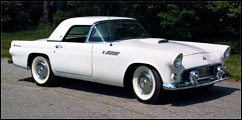 a civil rights movement to end segregation. "Guinness Book of World Records" was first published. On television, Captain Kangaroo with Bob Keeshan began its run on CBS. It would last for nearly forty years. "Gunsmoke" was another new series on the small screen. The celebrated Canadian pianist, Glenn Gould, recorded the "Goldberg Variations" by Bach. The Thunderbird, "T-Bird" hit the road. It was Ford's answer to GM's Corvette. Mickey Mantle won the AL home run title with 37. Willie Mays took the NL crown with 51.
a civil rights movement to end segregation. "Guinness Book of World Records" was first published. On television, Captain Kangaroo with Bob Keeshan began its run on CBS. It would last for nearly forty years. "Gunsmoke" was another new series on the small screen. The celebrated Canadian pianist, Glenn Gould, recorded the "Goldberg Variations" by Bach. The Thunderbird, "T-Bird" hit the road. It was Ford's answer to GM's Corvette. Mickey Mantle won the AL home run title with 37. Willie Mays took the NL crown with 51.
"My Fair Lady" (Lerner and Loewe) opened on Broadway in 1956. The soaps began to take hold as "As the 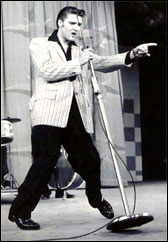 World Turns" and "The Edge of Night" premiered on CBS. Elvis had his first gold record, "Heartbreak Hotel" and made an appearance on "The Ed Sullivan Show." In July, Elvis appeared on the Steve Allen Show to sign "Hound Dog", accompanied by a basset hound. Don Larsen pitched the only perfect game in a World Series as the New York Yankees beat the Brooklyn Dodgers, 2-0. Russian troops and tanks attacked Budapest and crushed the Hungarian revolution. The U.S. Supreme Court struck down laws allowing racial segregation on public buses. William Whyte published "The Organization Man". Heavyweight boxing champion, Rocky Marciano retired, undefeated. Proctor & Gamble introduced Crest toothpaste. The Fortran computer language was developed. The
World Turns" and "The Edge of Night" premiered on CBS. Elvis had his first gold record, "Heartbreak Hotel" and made an appearance on "The Ed Sullivan Show." In July, Elvis appeared on the Steve Allen Show to sign "Hound Dog", accompanied by a basset hound. Don Larsen pitched the only perfect game in a World Series as the New York Yankees beat the Brooklyn Dodgers, 2-0. Russian troops and tanks attacked Budapest and crushed the Hungarian revolution. The U.S. Supreme Court struck down laws allowing racial segregation on public buses. William Whyte published "The Organization Man". Heavyweight boxing champion, Rocky Marciano retired, undefeated. Proctor & Gamble introduced Crest toothpaste. The Fortran computer language was developed. The 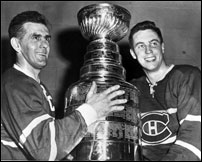 computer mouse was invented. Jerome Lemelson applied for a patent for his "machine vision device", now known as a bar code scanner. Cornelius McGillicuddy (aka Connie Mack) died. A.A. Milne, the author of Winnie the Pooh, died. Lawrence Durrell wrote his "Alexandria Quartet." The Montreal Canadiens began a string of five straight Stanley Cup titles (Rocket Richard & Jean Beliveau, right). A Porche 1600 c.c. Coupe was advertised for $3,700 FOB New York. The Boston Celtics got Bill Russell in the NBA draft and began a run of 11 NBA titles in 13 years. 24-year-old Mickey Mantle belted 52 homers and captured the Triple Crown and MVP Award. The Springhill Mine Disaster in Nova Scotia killed 39. In December, 1956, a Trans-Canada Airlines plane crashed near Chilliwack, British Columbia killing 62 people including football fans on their way home from the Grey Cup in Vancouver.
computer mouse was invented. Jerome Lemelson applied for a patent for his "machine vision device", now known as a bar code scanner. Cornelius McGillicuddy (aka Connie Mack) died. A.A. Milne, the author of Winnie the Pooh, died. Lawrence Durrell wrote his "Alexandria Quartet." The Montreal Canadiens began a string of five straight Stanley Cup titles (Rocket Richard & Jean Beliveau, right). A Porche 1600 c.c. Coupe was advertised for $3,700 FOB New York. The Boston Celtics got Bill Russell in the NBA draft and began a run of 11 NBA titles in 13 years. 24-year-old Mickey Mantle belted 52 homers and captured the Triple Crown and MVP Award. The Springhill Mine Disaster in Nova Scotia killed 39. In December, 1956, a Trans-Canada Airlines plane crashed near Chilliwack, British Columbia killing 62 people including football fans on their way home from the Grey Cup in Vancouver.
A "Whole Lotta Shakin' Going On " (Jerry Lee Lewis) in 1957. Fans saw the final games at Ebbets Field and the Polo Grounds. The National League approved the move of the Brooklyn Dodgers and New York Giants baseball teams to Los Angeles and San Francisco. Harry Belafonte recorded "The Banana Boat Song." Dick Clark's "American Bandstand" made its network debut on ABC. The Governor of Arkansas, Orval Faubus, used the National Guard to prevent nine black students from entering Central High School in Little Rock. President Eisenhower responded with Federal troops to press integration. Canadian Prime Minister Lester  Pearson was awarded the Nobel peace Prize. The Soviet Union stunned the world with the launch of Sputnik 1. It was the beginning of the Space Age. The event was timed to celebrate the 40th anniversary of the Bolshevik revolution. Paul Anka, of Ottawa, wrote and sang Diana. It was the first year of the Frisbee. "Perry Mason," starring Raymond Burr, and "Leave It to Beaver" premiered on CBS. Vance Packard wrote "Hidden Persuaders and Ayn Rand wrote her novel "Atlas Shrugged." Sam Cooke made a hit with "You Send Me" as did Buddy Knox with "Party Doll." Frank Sinatra sang "All the Way." AT&T introduced its Touchtone phones. The birth control pill developed in 1951 was approved in the US for treating menstrual problems. Actor Humphrey Bogart died of cancer. In Mao's China, more chaos. It began with life under the slogan "Let a hundred flowers bloom, and a hundred schools of thought contend.." It ended with tens of thousands of intellectuals jailed or sent to the countryside to do manual labour. Miles Davis and Gill Evans collaborated to produce several masterpieces, including "Porgy and Bess," and "Sketches of Spain." In June, 1957 John Diefenbaker of the Progressive Conservative Party won a slim minority in Canada's federal election. Nine months later, Diefenbaker would call another vote and win the largest majority in Canadian history taking 208 of the 265 seats. 38-year-old Ted Williams hit .388 to capture the AL batting title. He was the oldest player to do so. Milwaukee's Lew Burdette tossed three complete games, won them all as the Braves beat the Yankees in the World Series.
Pearson was awarded the Nobel peace Prize. The Soviet Union stunned the world with the launch of Sputnik 1. It was the beginning of the Space Age. The event was timed to celebrate the 40th anniversary of the Bolshevik revolution. Paul Anka, of Ottawa, wrote and sang Diana. It was the first year of the Frisbee. "Perry Mason," starring Raymond Burr, and "Leave It to Beaver" premiered on CBS. Vance Packard wrote "Hidden Persuaders and Ayn Rand wrote her novel "Atlas Shrugged." Sam Cooke made a hit with "You Send Me" as did Buddy Knox with "Party Doll." Frank Sinatra sang "All the Way." AT&T introduced its Touchtone phones. The birth control pill developed in 1951 was approved in the US for treating menstrual problems. Actor Humphrey Bogart died of cancer. In Mao's China, more chaos. It began with life under the slogan "Let a hundred flowers bloom, and a hundred schools of thought contend.." It ended with tens of thousands of intellectuals jailed or sent to the countryside to do manual labour. Miles Davis and Gill Evans collaborated to produce several masterpieces, including "Porgy and Bess," and "Sketches of Spain." In June, 1957 John Diefenbaker of the Progressive Conservative Party won a slim minority in Canada's federal election. Nine months later, Diefenbaker would call another vote and win the largest majority in Canadian history taking 208 of the 265 seats. 38-year-old Ted Williams hit .388 to capture the AL batting title. He was the oldest player to do so. Milwaukee's Lew Burdette tossed three complete games, won them all as the Braves beat the Yankees in the World Series.
In 1958, Elvis' music career took a back seat to the Army. He was inducted in Memphis. Canada's era of supersonic flight began with the maiden flight of the Avro CF-105 Arrow. The project was scrapped before the plan could be put into production. Arnold Palmer won his first Masters golf tournament. Stan Musial got hit number 3000. Charles de Gaulle became premier of France. Alaska became the 49th American state (with Hawaii to follow as the 50th). The first trans-Atlantic passenger jetliner service between London and New York was begun by BOAC. Remember the Kingston Trio? Remember the "Ballad of Tom Dooley."? Smaller cars entered the North American market courtesy of Toyota and Datsun. It was the first time kids could play with Lego those plastic building bricks. AT&T Bell Labs scientists invented the laser. And, the integrated circuit, or silicon chip came from Robert Noyce and Jack Kilby of Texas Instruments. Jerry Lee Lewis, was hot with Great Balls of Fire. The Cleveland Browns got Jimmy Brown who went on to lead the league in scoring and rushing. John Diefenbaker led the Canadian Conservatives to a huge federal election triumph. A collapse of the Second Narrows Bridge in Vancouver resulted in 18 deaths. The third disaster at the Springhill Mine in Nova Scotia killed 74.
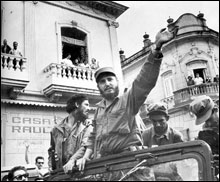 January 1st, 1959, Fidel Castro marched into Havana to mark the success of the Cuban Revolution. The Barbie Doll was introduced. February 3rd, 1959, The Day Music Died -- Buddy Holly, Ritchie Valens and the Big Bopper killed in a plane crash. NASA announced the selection of America's first seven astronauts for the US first orbital flight in 1962 . President Eisenhower joined Britain's Queen Elizabeth II in ceremonies officially opening the St. Lawrence Seaway. NBC launched "Bonanza," the first colour western on TV. Paul Anka had a hit with "Put Your head on My Shoulders." The Newport Folk Festival began. 18-year-old Joan Baez sang at the festival and launched her career as a professional singer. Americans bought 100 million Hula Hoops. Pantyhose first came out. Frank Lloyd Wright died at age 92. Robert Stack starred as Eliot Ness in the TV series "The Untouchables." Boston Celtics began a run of eight consecutive NBA titles. Bill Russell and Wilt Chamberlain faced off for the first time. The Richardsons of Regina won their first of four world curling titles. They would repeat in 1960, 1962 and 1963. Maurice Duplessis, Premier of Quebec, died.
January 1st, 1959, Fidel Castro marched into Havana to mark the success of the Cuban Revolution. The Barbie Doll was introduced. February 3rd, 1959, The Day Music Died -- Buddy Holly, Ritchie Valens and the Big Bopper killed in a plane crash. NASA announced the selection of America's first seven astronauts for the US first orbital flight in 1962 . President Eisenhower joined Britain's Queen Elizabeth II in ceremonies officially opening the St. Lawrence Seaway. NBC launched "Bonanza," the first colour western on TV. Paul Anka had a hit with "Put Your head on My Shoulders." The Newport Folk Festival began. 18-year-old Joan Baez sang at the festival and launched her career as a professional singer. Americans bought 100 million Hula Hoops. Pantyhose first came out. Frank Lloyd Wright died at age 92. Robert Stack starred as Eliot Ness in the TV series "The Untouchables." Boston Celtics began a run of eight consecutive NBA titles. Bill Russell and Wilt Chamberlain faced off for the first time. The Richardsons of Regina won their first of four world curling titles. They would repeat in 1960, 1962 and 1963. Maurice Duplessis, Premier of Quebec, died.
On the second day of 1960, Senator John F. Kennedy tossed his hat into the ring for the Democratic presidential nomination (he would defeat Richard Nixon for the presidency). "Camelot" opened on Broadway. It was the year of the Miracle On Ice -- the Americans stunning 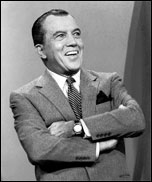 gold medal victory in the Olympic hockey championships in Squaw Valley. The big hits on TV (not in Lloydminster, but where they had TV) -- The Ed Sullivan Show, Bonanza, I Love Lucy. The lunch counter sit-ins began in the American South. In Switzerland, women finally got the right to vote in municipal elections. In Sharpeville, South Africa, a police massacre left 69 blacks dead. Baseball uniforms now sported player's names. The CIA in the US began a plot to invade Cuba. It resulted in the Bay of Pigs disaster. American pilot Gary Powers, in a U-2 spy plane, was shot down over Russia. Adolf Eichmann was captured by Israeli soldiers in Buenos Aires. The Nazi war criminal was convicted and hung. "Save the Last Dance For Me" was recorded by The Drifters. The marriage of television and politics occurred with the presidential debates between John F. Kennedy and Richard Nixon. Mohammad Ali (then known as Cassius Clay) was refused service at a restaurant in Louisville and promptly threw his Olympic gold medal for boxing into the Ohio River. Dallas has a football team. The Cowboys finish the season with no wins. Ralph Boston beat Jesse Owens' record in the long jump, a mark which had stood for 25 years. In the Summer Olympics in Rome, Wilma won three gold medals for the US.
gold medal victory in the Olympic hockey championships in Squaw Valley. The big hits on TV (not in Lloydminster, but where they had TV) -- The Ed Sullivan Show, Bonanza, I Love Lucy. The lunch counter sit-ins began in the American South. In Switzerland, women finally got the right to vote in municipal elections. In Sharpeville, South Africa, a police massacre left 69 blacks dead. Baseball uniforms now sported player's names. The CIA in the US began a plot to invade Cuba. It resulted in the Bay of Pigs disaster. American pilot Gary Powers, in a U-2 spy plane, was shot down over Russia. Adolf Eichmann was captured by Israeli soldiers in Buenos Aires. The Nazi war criminal was convicted and hung. "Save the Last Dance For Me" was recorded by The Drifters. The marriage of television and politics occurred with the presidential debates between John F. Kennedy and Richard Nixon. Mohammad Ali (then known as Cassius Clay) was refused service at a restaurant in Louisville and promptly threw his Olympic gold medal for boxing into the Ohio River. Dallas has a football team. The Cowboys finish the season with no wins. Ralph Boston beat Jesse Owens' record in the long jump, a mark which had stood for 25 years. In the Summer Olympics in Rome, Wilma won three gold medals for the US.
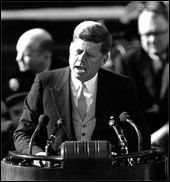 JFK took the oath of office in January, 1961.. "Ask not what your country can do for you, but what you can do for your country." Russia's Yuri Gagarin became the first spaceman. He made one orbit of the Earth before setting down safely (less than a month later, Astronaut Alan Shepard became the first American in space). The US launched the infamous Bay of Pigs invasion of Cuba. It was a disaster. The "Freedom Riders", a group of civil rights activists left Washington, D.C. for New Orleans to challenge racial segregation on buses (their own bus would be bombed and burned, activists attacked and beaten). President Kennedy announced his goal of a man on the moon by the end of the decade. Ernest Hemingway committed suicide. The erection of the Berlin Wall began. Roger Maris hit his 61st homer to beat the Babe's home run record. Dave Brubeck recorded "Take Five." "Surfin" was a moderately successful hit for a new group on the music scene, The Beach Boys . Patsy Cline recorded the Willie Nelson song "Crazy." The Tokens had a hit with "The Lion Sleeps Tonight." The Twist, from Chubby Checker, was a mega hit. Pampers, the disposable diaper, was introduced by Procter & Gamble.
JFK took the oath of office in January, 1961.. "Ask not what your country can do for you, but what you can do for your country." Russia's Yuri Gagarin became the first spaceman. He made one orbit of the Earth before setting down safely (less than a month later, Astronaut Alan Shepard became the first American in space). The US launched the infamous Bay of Pigs invasion of Cuba. It was a disaster. The "Freedom Riders", a group of civil rights activists left Washington, D.C. for New Orleans to challenge racial segregation on buses (their own bus would be bombed and burned, activists attacked and beaten). President Kennedy announced his goal of a man on the moon by the end of the decade. Ernest Hemingway committed suicide. The erection of the Berlin Wall began. Roger Maris hit his 61st homer to beat the Babe's home run record. Dave Brubeck recorded "Take Five." "Surfin" was a moderately successful hit for a new group on the music scene, The Beach Boys . Patsy Cline recorded the Willie Nelson song "Crazy." The Tokens had a hit with "The Lion Sleeps Tonight." The Twist, from Chubby Checker, was a mega hit. Pampers, the disposable diaper, was introduced by Procter & Gamble.
In February, 1962 John Glenn became the first American to orbit the earth. Wilt Chamberlain forced the NBA to re-write the record book as he scored 100 points as the Philadelphia Warriors beat the New York Knicks 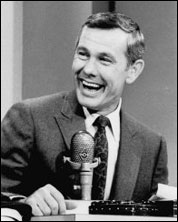 169-147. Transitions -- Jack Paar gave way to Johnny Carson on NBC's "Tonight" and Walter Cronkite took over as anchor of the "The CBS Evening News." Jackie Robinson became the first African American to be inducted into baseball's Hall of Fame. Marilyn Monroe's death was ruled a "probable
169-147. Transitions -- Jack Paar gave way to Johnny Carson on NBC's "Tonight" and Walter Cronkite took over as anchor of the "The CBS Evening News." Jackie Robinson became the first African American to be inducted into baseball's Hall of Fame. Marilyn Monroe's death was ruled a "probable 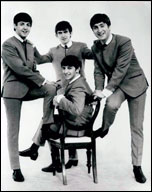 suicide". The Beatles put their first single on vinyl for EMI -- "Love Me Do" and "P.S. I Love You". With thousands of Federal troops at the ready, black student James Meredith registered for classes at the University of Mississippi. James Watson, Francis Crick and Maurice Wilkins won the Nobel Prize for their work on DNA. Artist Andy Warhol gained notoriety with his "Soup Can" series. Rachel Carson published "Silent Spring" awakening people to the dangers of pesticides. Tony Bennett sang what became his musical signature "I left My Heart in San Francisco." Bob Dylan released his first album and Mick Jagger and Keith Richards formed The Rolling Stones. The drug thalidomide crippled thousands of babies. In his first professional triumph Jack Nicklaus defeated Arnold Palmer for the U.S. Open title.
suicide". The Beatles put their first single on vinyl for EMI -- "Love Me Do" and "P.S. I Love You". With thousands of Federal troops at the ready, black student James Meredith registered for classes at the University of Mississippi. James Watson, Francis Crick and Maurice Wilkins won the Nobel Prize for their work on DNA. Artist Andy Warhol gained notoriety with his "Soup Can" series. Rachel Carson published "Silent Spring" awakening people to the dangers of pesticides. Tony Bennett sang what became his musical signature "I left My Heart in San Francisco." Bob Dylan released his first album and Mick Jagger and Keith Richards formed The Rolling Stones. The drug thalidomide crippled thousands of babies. In his first professional triumph Jack Nicklaus defeated Arnold Palmer for the U.S. Open title.
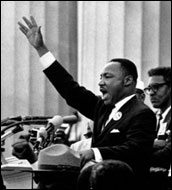 A few days into 1963 George Wallace was sworn in as governor of Alabama with a pledge of "segregation forever." Reverend Dr. Martin Luther King began the first non-violent campaign in Birmingham, Alabama (police used dogs and cattle prods on civil rights demonstrators). Medgar Evers, of the NAACP in Mississippi, was shot and killed by the KKK in front of his home in Jackson. Four young black girls, attending Sunday school, were killed when a bomb exploded at a church in Birmingham, Alabama. The case was finally closed in 2002 when the last of the murderers was convicted and sentenced to life in prison.
A few days into 1963 George Wallace was sworn in as governor of Alabama with a pledge of "segregation forever." Reverend Dr. Martin Luther King began the first non-violent campaign in Birmingham, Alabama (police used dogs and cattle prods on civil rights demonstrators). Medgar Evers, of the NAACP in Mississippi, was shot and killed by the KKK in front of his home in Jackson. Four young black girls, attending Sunday school, were killed when a bomb exploded at a church in Birmingham, Alabama. The case was finally closed in 2002 when the last of the murderers was convicted and sentenced to life in prison. 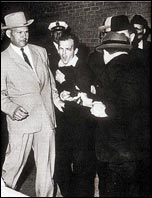 The Post Office in the US began using five-digit zip codes. Betty Friedan's The Feminine Mystique ushered in a new wave of feminism. The tranquilizer Valium was introduced and quickly became a standard drug for the treatment of anxiety and one of the most commonly used drugs of all time. Among the movies which debuted in 1953 where The Great Escape, with Steve McQueen, and The Birds from Alfred Hitchcock. Sandy Koufax was the story in baseball. The left-hander was the Cy Young winner and the Most Valuable Player. For an encore he won two games in the World Series as the Dodgers beat the Yankees in four straight. Toronto Maple Leafs won the Stanley Cup. In the Canadian federal election, Lester Pearson's Liberals won a minority government. Britain had its "Great Train Robbery" as thieves held up the Glasgow to London Royal Mail and took off with what today would be about 60-70-million dollars. The civil rights March on Washington drew about 250,000 demonstrators. It was the scene of Dr. King's "I Have a Dream" speech in front of the Lincoln Memorial. John F. Kennedy was assassinated In Dallas, Texas. Police arrested Lee Harvey Oswald as the suspected assassin. Osward was murdered by Jack Ruby. Vice-President Lyndon B. Johnson was sworn in as the 36th President of the United States. The Front de libération du Québec set off its first bombs in Quebec.
The Post Office in the US began using five-digit zip codes. Betty Friedan's The Feminine Mystique ushered in a new wave of feminism. The tranquilizer Valium was introduced and quickly became a standard drug for the treatment of anxiety and one of the most commonly used drugs of all time. Among the movies which debuted in 1953 where The Great Escape, with Steve McQueen, and The Birds from Alfred Hitchcock. Sandy Koufax was the story in baseball. The left-hander was the Cy Young winner and the Most Valuable Player. For an encore he won two games in the World Series as the Dodgers beat the Yankees in four straight. Toronto Maple Leafs won the Stanley Cup. In the Canadian federal election, Lester Pearson's Liberals won a minority government. Britain had its "Great Train Robbery" as thieves held up the Glasgow to London Royal Mail and took off with what today would be about 60-70-million dollars. The civil rights March on Washington drew about 250,000 demonstrators. It was the scene of Dr. King's "I Have a Dream" speech in front of the Lincoln Memorial. John F. Kennedy was assassinated In Dallas, Texas. Police arrested Lee Harvey Oswald as the suspected assassin. Osward was murdered by Jack Ruby. Vice-President Lyndon B. Johnson was sworn in as the 36th President of the United States. The Front de libération du Québec set off its first bombs in Quebec.
1964 brought what, to some, is viewed as the "official" star of the war in Vietnam. In response to alleged North Vietnamese aggression in the Gulf of Tonkin, the U.S. Congress authorized the President to expand military involvement in the country. Seven months later, the first U.S. combat troops arrived in Vietnam to join "military 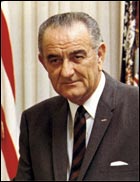 advisers" already there. President Johnson declared a "war on poverty in America" and signed into law the Civil
advisers" already there. President Johnson declared a "war on poverty in America" and signed into law the Civil 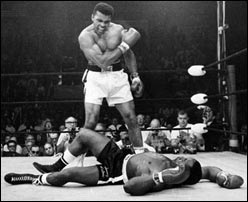 Rights Act of 1964. Cassius Clay, a heavy underdog, defeated Sonny Liston to win the heavyweight boxing championship then announced he had joined the Nation of Islam and changed his name to Muhammad Ali. The U.S. Surgeon General released a landmark report on cigarette smoking. It concluded there was a link between smoking and serious health problems, including lung cancer (at the time nearly half of all Americans smoked). The toy company Hasbro introduced a line of toys called G.I. Joe. The "doll for boys" became known as an "action figure" and spawned a flood of imitators. Three young civil rights activists, working to register black voters, were murdered in Mississippi (Mississippi Burning, a movie, loosely based on the event, was released in 1988). It wasn't until 2005 that a primary figure in the case, then 80, was convicted and sentence to 60 years in prison. Martin Luther King, Jr., won the Nobel Peace Prize. In November, 1964, Johnson trounced Republican Barry Goldwater in the presidential election gaining over 60% of the popular vote and carrying 44 of the 50 states. It was one of the most lop-sided margins in American history. The Beatles' "I Want to Hold Your Hand" zoomed to number one on the charts and the group made its North American television debut on the Ed Sullivan show. The Warren Commission report found Lee Harvey Oswald had acted alone in the assassination of President Kennedy. Nikita Khrushchev was ousted in the Soviet Union. Leonid Brezhnev became the new First Secretary of the Communist Party. In South Africa, Nelson Mandela was convicted of sabotage and imprisoned for life. Released in 1990, Mandela became the country's president following elections in 1994. The movies included a classic musical, My Fair Lady (the Oscar winner) and Dr. Strangelove or : How I Learned to Stop Worrying and Love the Bomb, a black comedy, from Stanley Kubrick, featuring Peter Sellers
Rights Act of 1964. Cassius Clay, a heavy underdog, defeated Sonny Liston to win the heavyweight boxing championship then announced he had joined the Nation of Islam and changed his name to Muhammad Ali. The U.S. Surgeon General released a landmark report on cigarette smoking. It concluded there was a link between smoking and serious health problems, including lung cancer (at the time nearly half of all Americans smoked). The toy company Hasbro introduced a line of toys called G.I. Joe. The "doll for boys" became known as an "action figure" and spawned a flood of imitators. Three young civil rights activists, working to register black voters, were murdered in Mississippi (Mississippi Burning, a movie, loosely based on the event, was released in 1988). It wasn't until 2005 that a primary figure in the case, then 80, was convicted and sentence to 60 years in prison. Martin Luther King, Jr., won the Nobel Peace Prize. In November, 1964, Johnson trounced Republican Barry Goldwater in the presidential election gaining over 60% of the popular vote and carrying 44 of the 50 states. It was one of the most lop-sided margins in American history. The Beatles' "I Want to Hold Your Hand" zoomed to number one on the charts and the group made its North American television debut on the Ed Sullivan show. The Warren Commission report found Lee Harvey Oswald had acted alone in the assassination of President Kennedy. Nikita Khrushchev was ousted in the Soviet Union. Leonid Brezhnev became the new First Secretary of the Communist Party. In South Africa, Nelson Mandela was convicted of sabotage and imprisoned for life. Released in 1990, Mandela became the country's president following elections in 1994. The movies included a classic musical, My Fair Lady (the Oscar winner) and Dr. Strangelove or : How I Learned to Stop Worrying and Love the Bomb, a black comedy, from Stanley Kubrick, featuring Peter Sellers 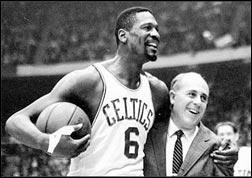 playing three different roles. Led by Bill Russell, the Boston Celtics won their sixth consecutive NBA championship. In Japan, the bullet train, the Tōkaidō Shinkansen began service on 1 October 1964, in time for the Tokyo Olympics (today's trains run at speeds of up to 180 mph, with one under development in 2011 expected to hit speeds of up to 310 mph). The Good Friday Earthquake, the most powerful ever in North America, rocked south-central Alaska. The controversial public affairs program This Hour Has Seven Days launched on CBC television. Northern Dancer won the Kentucky Derby. After much debate and controversy, Canada had a new flag, replacing the Union Jack with the Maple Leaf. Understanding Media, by Canadian scholar Marshall McLuhan, was published.
playing three different roles. Led by Bill Russell, the Boston Celtics won their sixth consecutive NBA championship. In Japan, the bullet train, the Tōkaidō Shinkansen began service on 1 October 1964, in time for the Tokyo Olympics (today's trains run at speeds of up to 180 mph, with one under development in 2011 expected to hit speeds of up to 310 mph). The Good Friday Earthquake, the most powerful ever in North America, rocked south-central Alaska. The controversial public affairs program This Hour Has Seven Days launched on CBC television. Northern Dancer won the Kentucky Derby. After much debate and controversy, Canada had a new flag, replacing the Union Jack with the Maple Leaf. Understanding Media, by Canadian scholar Marshall McLuhan, was published.
For residents of Ontario, New York, New Jersey and some neighbouring states, 1965 would be well remembered as the year of the Great Northeastern Blackout. On November 9th, at rush hour, 30-million people were affected 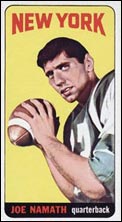 with the loss of power for up to 12 hours. Sparked by the arrest of a black motorist, riots broke out in the Watts section of Los Angeles. Six days of rioting resulted in 34 deaths, more than 1,000 injured, and hundreds of buildings damaged or destroyed. Malcolm X was assassinated by rival National of Islam members while addressing his congregation in Harlem. Satisfaction by the Rolling Stones climbed to number one on the music charts. Bob Dylan caused a sensation at the Newport Folk Festival by "going electric". One of Toronto's most distinctive landmarks, City Hall, was officially opened. New York Jets signed quarterback Joe Namath. 16-year-old Peggy Fleming won the U.S. ladies figure skating title. The first U.S. combat forces, 3.500 Marines, arrived in Vietnam. Morley Safer of CBS
with the loss of power for up to 12 hours. Sparked by the arrest of a black motorist, riots broke out in the Watts section of Los Angeles. Six days of rioting resulted in 34 deaths, more than 1,000 injured, and hundreds of buildings damaged or destroyed. Malcolm X was assassinated by rival National of Islam members while addressing his congregation in Harlem. Satisfaction by the Rolling Stones climbed to number one on the music charts. Bob Dylan caused a sensation at the Newport Folk Festival by "going electric". One of Toronto's most distinctive landmarks, City Hall, was officially opened. New York Jets signed quarterback Joe Namath. 16-year-old Peggy Fleming won the U.S. ladies figure skating title. The first U.S. combat forces, 3.500 Marines, arrived in Vietnam. Morley Safer of CBS 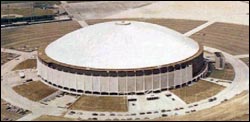 reported the U.S. as losing the war. Baseball went indoors. In the first game in Houston's Astrodome, Houston beat the Yankees 2-1 in exhibition play as Mickey Mantle hit the first indoor homer. Jack Nicklaus won the Masters. Sonny and Cher made their first television appearance. The Rolling Stones' Satisfaction climbed to number one on the charts. Sandy Koufax pitched his fourth no-hitter, this one a perfect game. A new Disney theme park was announced for the Orlando, Florida area. Designer Mary Quant popularized the mini-skirt. Ralph Nader's book Unsafe at Any Speed was published and creates quite a stir. In California's Central Valley, workers walked out at 33 grape ranches in the Delano area and were joined by members of the National Farm Workers Association under César Chávez. The strike and a boycott of table grapes went on for five years but finally resulted in a contract with the major grape growers in the state. The Oscar for best movie went to The Sound of Music, starring Julie Andrews.
reported the U.S. as losing the war. Baseball went indoors. In the first game in Houston's Astrodome, Houston beat the Yankees 2-1 in exhibition play as Mickey Mantle hit the first indoor homer. Jack Nicklaus won the Masters. Sonny and Cher made their first television appearance. The Rolling Stones' Satisfaction climbed to number one on the charts. Sandy Koufax pitched his fourth no-hitter, this one a perfect game. A new Disney theme park was announced for the Orlando, Florida area. Designer Mary Quant popularized the mini-skirt. Ralph Nader's book Unsafe at Any Speed was published and creates quite a stir. In California's Central Valley, workers walked out at 33 grape ranches in the Delano area and were joined by members of the National Farm Workers Association under César Chávez. The strike and a boycott of table grapes went on for five years but finally resulted in a contract with the major grape growers in the state. The Oscar for best movie went to The Sound of Music, starring Julie Andrews.
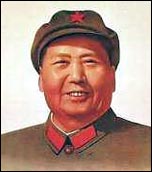 1966 marked the beginning of Mao's Cultural Revolution in China. Red Guard groups, formed from the country's youth instigated violent conflict with those considered capitalist figures. Millions were persecuted and a large segment of the population was forced to move to rural areas. Cigarette companies were forced to carry warning signs on their packs, "Caution Cigarette smoking may be hazardous to your health". The U.S. Supreme Court handed down the Miranda rule on rights of the accused. NOW, the National Organization of Women, was established. Huey Newton and Bobby Seale organized the Black Panther Party in Oakland. IBM
1966 marked the beginning of Mao's Cultural Revolution in China. Red Guard groups, formed from the country's youth instigated violent conflict with those considered capitalist figures. Millions were persecuted and a large segment of the population was forced to move to rural areas. Cigarette companies were forced to carry warning signs on their packs, "Caution Cigarette smoking may be hazardous to your health". The U.S. Supreme Court handed down the Miranda rule on rights of the accused. NOW, the National Organization of Women, was established. Huey Newton and Bobby Seale organized the Black Panther Party in Oakland. IBM 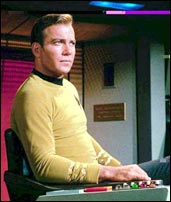 developed DRAM (Dynamic Random Access Memory) for fast and reliable data storage on computers. Star Trek debuted on NBC. Ronald Reagan won a huge victory over incumbent Pat Brown for the governorship of California. Willie Mays signed a contract for the then stunning figure of $130,000 a season. Marvin Miller was selected as executive director of the baseball Players' Association. Bobby Hull potted his 51st goal of the season, a record. The Beach Boys released a groundbreaking album, Pet Sounds. The Rowan and Martin Show debuted on NBC-TV. Richard Speck murdered eight nurses in Chicago. Charles Whitman killed 16 people and wounded 32 others in a shooting rampage on and around the University of Texas campus. High school miler Jim Ryan set a record of 3.53.3. The first Jerry Lewis Muscular Dystrophy telethon raised $15,000. Joan Baez and 123 other anti-draft protesters were arrested in Oakland. The Munsinger Affair was Canada's first big political sex scandal. In Toronto, the Bloor-Danforth line was opened for business. In Montreal, the rubber-tired Metro began service.
developed DRAM (Dynamic Random Access Memory) for fast and reliable data storage on computers. Star Trek debuted on NBC. Ronald Reagan won a huge victory over incumbent Pat Brown for the governorship of California. Willie Mays signed a contract for the then stunning figure of $130,000 a season. Marvin Miller was selected as executive director of the baseball Players' Association. Bobby Hull potted his 51st goal of the season, a record. The Beach Boys released a groundbreaking album, Pet Sounds. The Rowan and Martin Show debuted on NBC-TV. Richard Speck murdered eight nurses in Chicago. Charles Whitman killed 16 people and wounded 32 others in a shooting rampage on and around the University of Texas campus. High school miler Jim Ryan set a record of 3.53.3. The first Jerry Lewis Muscular Dystrophy telethon raised $15,000. Joan Baez and 123 other anti-draft protesters were arrested in Oakland. The Munsinger Affair was Canada's first big political sex scandal. In Toronto, the Bloor-Danforth line was opened for business. In Montreal, the rubber-tired Metro began service.
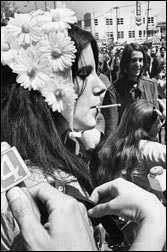 In the United States, 1967 was both the "Summer of Love" and the "Long, Hot Summer". San Francisco was the epicentre of the emergence of a new counterculture as thousands of Flower Children flocked to Haight-Ashbury, Berkeley and other Bay area locales to engage new ideas and lifestyles.
In the United States, 1967 was both the "Summer of Love" and the "Long, Hot Summer". San Francisco was the epicentre of the emergence of a new counterculture as thousands of Flower Children flocked to Haight-Ashbury, Berkeley and other Bay area locales to engage new ideas and lifestyles.
If you're going to San Francisco,
be sure to wear some flowers in your hair.
If you come to San Francisco,
Summertime will be a love-in there.
The song "San Francisco (Be Sure to Wear Flowers in Your Hair)", written to promote the Monterey Pop Festival was an instant hit both in North American and Europe. Hippies gathered in dozens of cities around the world. In Toronto, Yorkville was the centre of the action. The year also saw unprecedented race riots, the largest of which occurred in Newark and Detroit. 1967 was a special year for Canadians as it marked the country's 100th birthday and celebrations were held across the nation. The focus was on Expo 67 in Montreal, a highly successful World's Fair. In what would later be called the Super Bowl, the Green Bay Packers defeated the Kansas City Chiefs 35-10 in the first AFL-NFL championship game. Packers' quarterback Bart Starr was named MVP.The Caribbean community in Toronto staged the inaugural Caribana. It would grow into one of the largest carnivals in the world. Winnipeg hosted the 5th Pan 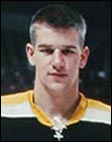 American Games at which Canada featured its first national baseball team. Boston's Bobby Orr won the first of his eight consecutive Norris Trophies as the top defenseman in the National Hockey League. The Toronto Maple Leafs defeated Montreal to win the Stanley Cup. Race riots erupted across the United States. The worst occurred in Newark, New Jersey and Detroit, Michigan. Israel
American Games at which Canada featured its first national baseball team. Boston's Bobby Orr won the first of his eight consecutive Norris Trophies as the top defenseman in the National Hockey League. The Toronto Maple Leafs defeated Montreal to win the Stanley Cup. Race riots erupted across the United States. The worst occurred in Newark, New Jersey and Detroit, Michigan. Israel 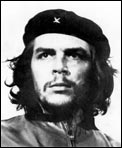 made quick work of Egypt, Jordan and Syria in the Six Day War taking control of the Gaza Strip, the Sinai Peninsula, the West Bank and East Jerusalem. The Apollo 1 fire killed astronauts Virgil "Gus" Grissom, Edward White and Roger Chaffee. The Beatles released "All You Need is Love" and "Light My Fire" by the Doors hits #1. Remember the Age of Aquarius? Hair the hippie counter-culture rock musical opened on Broadway. Che Guevara, a Marxist revolutionary and key figure in Castro's takeover of Cuba, was killed. Otis Redding died in a plane crash at age 26, just a month before the release of his biggest hit, "Sittin' On The Dock of the Bay". The first heart transplant was done by Dr. Christiaan Barnard in Cape Town, South Africa. Thurgood Marshall was sworn in as the first African-American justice of the U.S. Supreme Court. Abbie Hoffman and friends announce the establishment of the Youth International Party, the Yippies. The Graduate, starring Dustin Hoffman, was among the best of the movies.
made quick work of Egypt, Jordan and Syria in the Six Day War taking control of the Gaza Strip, the Sinai Peninsula, the West Bank and East Jerusalem. The Apollo 1 fire killed astronauts Virgil "Gus" Grissom, Edward White and Roger Chaffee. The Beatles released "All You Need is Love" and "Light My Fire" by the Doors hits #1. Remember the Age of Aquarius? Hair the hippie counter-culture rock musical opened on Broadway. Che Guevara, a Marxist revolutionary and key figure in Castro's takeover of Cuba, was killed. Otis Redding died in a plane crash at age 26, just a month before the release of his biggest hit, "Sittin' On The Dock of the Bay". The first heart transplant was done by Dr. Christiaan Barnard in Cape Town, South Africa. Thurgood Marshall was sworn in as the first African-American justice of the U.S. Supreme Court. Abbie Hoffman and friends announce the establishment of the Youth International Party, the Yippies. The Graduate, starring Dustin Hoffman, was among the best of the movies.
The 1968 assassination of Martin Luther King in Memphis, Tennessee sparked uprisings in more than 100 cities across the country. Dozens were killed. Lyndon Johnson shocked America with the announcement he would not run for a second term as President. Robert Kennedy was assassinated in Los Angeles, after winning the California primary for the Democratic nomination for President. In Chicago, the Democratic convention nominated Hubert Humphrey in the midst of massive demonstrations. 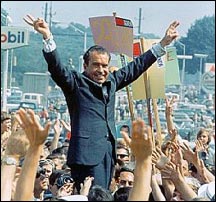 Richard Nixon defeated Humphrey and George Wallace for the presidency.
Richard Nixon defeated Humphrey and George Wallace for the presidency. 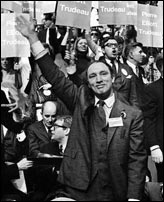 Pierre Trudeau became Canadian Prime Minster after his Liberals won the federal election. In Quebec, the Parti Québécois was formed under leader René Lévesque. Eight years later the PQ would win a majority government in the province. A student revolt in Paris was joined by 10-million workers in a general strike which virtually shutdown the French economy and nearly caused the collapse of the government. "60 Minutes" premiered on CBS-TV. LA Dodger Don Drysdale pitched a record six consecutive, complete game shutouts and 58 2/3s shutout innings overall. Denny McLain was the story in the American League with a remarkable 31-6 record. He won the Cy Young and the MVP. A Boeing 747, the world's largest civilian airplane, was rolled out of the assembly building in Everett, WA before the media and representatives of the airlines that had ordered the airliner. It would have its first commercial flight in 1970. Up to
Pierre Trudeau became Canadian Prime Minster after his Liberals won the federal election. In Quebec, the Parti Québécois was formed under leader René Lévesque. Eight years later the PQ would win a majority government in the province. A student revolt in Paris was joined by 10-million workers in a general strike which virtually shutdown the French economy and nearly caused the collapse of the government. "60 Minutes" premiered on CBS-TV. LA Dodger Don Drysdale pitched a record six consecutive, complete game shutouts and 58 2/3s shutout innings overall. Denny McLain was the story in the American League with a remarkable 31-6 record. He won the Cy Young and the MVP. A Boeing 747, the world's largest civilian airplane, was rolled out of the assembly building in Everett, WA before the media and representatives of the airlines that had ordered the airliner. It would have its first commercial flight in 1970. Up to 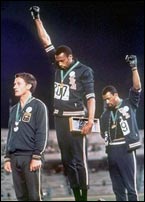 500 unarmed civilians, most women, children and the elderly, were murdered in South Vietnam by a unit of the U.S. Army. It became known as the My Lai Massacre. The incident was brought to public attention in 1969. Of the 26 servicemen charged in connection with the massacre only one, William Calley, was convicted. He was sentenced in 1971 to life imprisonment, but served just three and a half years under house arrest. Soviet troops invaded Czechoslovakia to end a period of political liberalization known as Prague Spring under reformist leader Alexander Dubček. In a surprise attack, North Vietnamese launched an assault, known as the Tet Offensive, on dozens of cities and towns in South Vietnam. Track stars Tommie Smith and John Carlos were suspended for giving a black power salute after receiving their medals at the Olympic Games in Mexico City. Bob Beamon made an incredible leap of 29 feet, 2 1/2 inches to win the long jump at the Olympics breaking the record by a stunning 21 3/4 inches. In the high jump, Dick Fosbury won the gold using a radical new technique he called the Fosbury Flop. Jaqueline Kennedy marries Aristotle Onassis on the island of Scorpios. USC running back O.J. Simpson was named winner of the Heisman Trophy as the outstanding player in college football. One of the most talked-about movies was 2001: A Space Odyssey, with HAL, a computer, among the stars.
500 unarmed civilians, most women, children and the elderly, were murdered in South Vietnam by a unit of the U.S. Army. It became known as the My Lai Massacre. The incident was brought to public attention in 1969. Of the 26 servicemen charged in connection with the massacre only one, William Calley, was convicted. He was sentenced in 1971 to life imprisonment, but served just three and a half years under house arrest. Soviet troops invaded Czechoslovakia to end a period of political liberalization known as Prague Spring under reformist leader Alexander Dubček. In a surprise attack, North Vietnamese launched an assault, known as the Tet Offensive, on dozens of cities and towns in South Vietnam. Track stars Tommie Smith and John Carlos were suspended for giving a black power salute after receiving their medals at the Olympic Games in Mexico City. Bob Beamon made an incredible leap of 29 feet, 2 1/2 inches to win the long jump at the Olympics breaking the record by a stunning 21 3/4 inches. In the high jump, Dick Fosbury won the gold using a radical new technique he called the Fosbury Flop. Jaqueline Kennedy marries Aristotle Onassis on the island of Scorpios. USC running back O.J. Simpson was named winner of the Heisman Trophy as the outstanding player in college football. One of the most talked-about movies was 2001: A Space Odyssey, with HAL, a computer, among the stars.
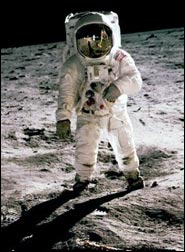 1969 produced one of the most significant technological achievements of all time. "One small step for (a) man, one giant leap for mankind." The words of astronaut Neil Armstrong as he and Buzz Aldrin became the first to set foot on the moon. The year also saw the establishment of ArpaNET, which would evolve into the Internet. CompuServe, the first commercial online service, began operations. There was growing opposition to the war in Vietnam. In October, millions took the day off work and school to participate in the Moratorium to End the War. A month later, half a million people attended an anti-war demonstration in Washington and a protest march in San Francisco. Emboldened by the student protests in France and the civil rights demonstrations in the United States, Catholics in Northern Ireland began civil rights marches which, with responses by the Protestant majority, escalated into violence. Parliament was suspended and direct rule from London imposed. Some of the most popular television characters of all time made their debut.
1969 produced one of the most significant technological achievements of all time. "One small step for (a) man, one giant leap for mankind." The words of astronaut Neil Armstrong as he and Buzz Aldrin became the first to set foot on the moon. The year also saw the establishment of ArpaNET, which would evolve into the Internet. CompuServe, the first commercial online service, began operations. There was growing opposition to the war in Vietnam. In October, millions took the day off work and school to participate in the Moratorium to End the War. A month later, half a million people attended an anti-war demonstration in Washington and a protest march in San Francisco. Emboldened by the student protests in France and the civil rights demonstrations in the United States, Catholics in Northern Ireland began civil rights marches which, with responses by the Protestant majority, escalated into violence. Parliament was suspended and direct rule from London imposed. Some of the most popular television characters of all time made their debut. 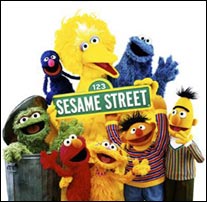 Big Bird, Oscar the Grouch, Ernie and Bert, Grover, and the Cookie Monster. They were Jim Henson's Muppets, on the new PBS children's program Sesame Street. Mary Jo Kopechne, a passenger in a car driven by U.S. Senator Edward Kennedy was killed when Kennedy accidentally drove the vehicle off a bridge on Chappaquiddick Island. Charles Manson and followers were arrested after a spate of gruesome murders in Los Angeles. Woodstock became one of the defining events in popular music and counterculture experience. A half million people endured the rain and mud to participate in history-making, three-day concert. In December, the Rolling Stones were among the featured performers at a rock concert at the Altamont Speedway in the Bay Area. It was supposed to be Woodstock West,
Big Bird, Oscar the Grouch, Ernie and Bert, Grover, and the Cookie Monster. They were Jim Henson's Muppets, on the new PBS children's program Sesame Street. Mary Jo Kopechne, a passenger in a car driven by U.S. Senator Edward Kennedy was killed when Kennedy accidentally drove the vehicle off a bridge on Chappaquiddick Island. Charles Manson and followers were arrested after a spate of gruesome murders in Los Angeles. Woodstock became one of the defining events in popular music and counterculture experience. A half million people endured the rain and mud to participate in history-making, three-day concert. In December, the Rolling Stones were among the featured performers at a rock concert at the Altamont Speedway in the Bay Area. It was supposed to be Woodstock West, 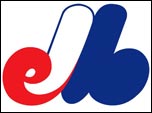 but with continuing violence, including a homicide, three accidental deaths, dozens of injuries, and extensive property damage it became a symbol of the end of "The Age of Aquarius". Canada got a major league baseball team. The Montreal Expos began play at Jarry Field. The Miracle Mets won the World Series in a huge upset. The 1962 expansion team had never finished higher than second to last and were not highly regarded going into the season. Yasser Arafat became leader of the Palestine Liberation Organization. CBS-TV cancelled the Smothers Brothers Comedy Hour because of anti-war and radical content. Easy Rider (Pete Fonda, Dennis Hopper, Jack Nicholson) and Butch Cassidy and the Sundance Kid (Robert Redford and Paul Newman) were two of the year's top motion pictures. Joe Namath boldly predicted a victory for his underdog New York Jets over Johnny Unitas and the Baltimore Colts in the Super Bowl. Then we went out and did it. Jets 16 Colts 7 with Namath as MVP.
but with continuing violence, including a homicide, three accidental deaths, dozens of injuries, and extensive property damage it became a symbol of the end of "The Age of Aquarius". Canada got a major league baseball team. The Montreal Expos began play at Jarry Field. The Miracle Mets won the World Series in a huge upset. The 1962 expansion team had never finished higher than second to last and were not highly regarded going into the season. Yasser Arafat became leader of the Palestine Liberation Organization. CBS-TV cancelled the Smothers Brothers Comedy Hour because of anti-war and radical content. Easy Rider (Pete Fonda, Dennis Hopper, Jack Nicholson) and Butch Cassidy and the Sundance Kid (Robert Redford and Paul Newman) were two of the year's top motion pictures. Joe Namath boldly predicted a victory for his underdog New York Jets over Johnny Unitas and the Baltimore Colts in the Super Bowl. Then we went out and did it. Jets 16 Colts 7 with Namath as MVP.
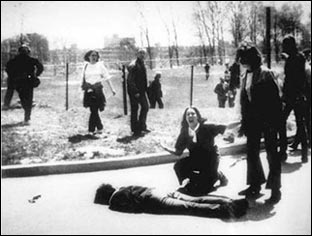 The 1970 Kent State Massacre shocked the nation. Four unarmed college students were shot and killed, and nine wounded, by Ohio National Guardsmen. Some of the students had been protesting the American invasion of Cambodia. Ten days later, police killed two students and injured twelve when they opened fire on demonstrators at Jackson State College in Mississippi. Major demonstrations were held in Washington and San Francisco. 30 ROTC buildings were burned or bombed. National Guard units were activated on 21 campuses in 16 states. A national Student Strike involved four million students at college and high schools across the country. The "October Crisis" rocked Canada. The federal government imposed the War Measures Act to give police and the military extraordinary powers in the wake of the kidnapping and death of Quebec's Labour Minister Pierre Laporte and the kidnapping of British diplomat James Cross by the Front de libération du Québec (FLQ). All 109 aboard died in the
The 1970 Kent State Massacre shocked the nation. Four unarmed college students were shot and killed, and nine wounded, by Ohio National Guardsmen. Some of the students had been protesting the American invasion of Cambodia. Ten days later, police killed two students and injured twelve when they opened fire on demonstrators at Jackson State College in Mississippi. Major demonstrations were held in Washington and San Francisco. 30 ROTC buildings were burned or bombed. National Guard units were activated on 21 campuses in 16 states. A national Student Strike involved four million students at college and high schools across the country. The "October Crisis" rocked Canada. The federal government imposed the War Measures Act to give police and the military extraordinary powers in the wake of the kidnapping and death of Quebec's Labour Minister Pierre Laporte and the kidnapping of British diplomat James Cross by the Front de libération du Québec (FLQ). All 109 aboard died in the 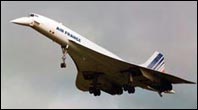 crash of an Air Canada DC-8 at Toronto International Airport. A half million people were killed as the Bhola cyclone hit East Pakistan (Bangladesh). A prototype of a
crash of an Air Canada DC-8 at Toronto International Airport. A half million people were killed as the Bhola cyclone hit East Pakistan (Bangladesh). A prototype of a 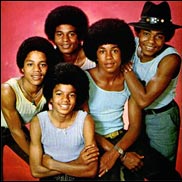 Concorde super-sonic airliner made its first test flight. The Jackson 5, starring Michael Jackson, made their television debut on American Bandstand. The Soap Opera "All My Children" and "Monday Night Football" premiered on ABC. Paul McCartney announced the breakup of the Beatles. California's "no fault" divorce law went into effect. Gary Trudeau's comic strip "Doonesbury" made its debut in two dozen newspapers. Jimi Hendrix and Janis Joplin died of drug overdoses. MASH, the movie, a 1970 film, spawned MASH on television (1972), one of the most popular shows of all time. Among the music hits of 1970, the Jackson 5's I'll Be There, Bridge Over Troubled Water (Simon and Garfunkel), (They Long to Be) Close to You (Carpenters), American Woman (The Guess Who), Raindrops Keep Fallin' On My Head (B.J. Thomas), Ain't No Mountain High Enough (Diana Ross) and Signed, Sealed, Delivered I'm Yours ( Stevie Wonder). The first portable, pocket calculators appeared in Japan and soon spread world wide.
Concorde super-sonic airliner made its first test flight. The Jackson 5, starring Michael Jackson, made their television debut on American Bandstand. The Soap Opera "All My Children" and "Monday Night Football" premiered on ABC. Paul McCartney announced the breakup of the Beatles. California's "no fault" divorce law went into effect. Gary Trudeau's comic strip "Doonesbury" made its debut in two dozen newspapers. Jimi Hendrix and Janis Joplin died of drug overdoses. MASH, the movie, a 1970 film, spawned MASH on television (1972), one of the most popular shows of all time. Among the music hits of 1970, the Jackson 5's I'll Be There, Bridge Over Troubled Water (Simon and Garfunkel), (They Long to Be) Close to You (Carpenters), American Woman (The Guess Who), Raindrops Keep Fallin' On My Head (B.J. Thomas), Ain't No Mountain High Enough (Diana Ross) and Signed, Sealed, Delivered I'm Yours ( Stevie Wonder). The first portable, pocket calculators appeared in Japan and soon spread world wide.
1971 D.B. Cooper hijacked a Boeing 727 flying between Portland and Seattle, took $200,000 in ransom and parachuted into the night sky. He was never found. His audacious crime made Cooper a cult figure to many and there were songs, books, movies and television programs based on his daring exploit. An estimated 300,000 to 500,000 people participated in May Day anti-war demonstrations over five days in Washington. Among the protesters were many veterans from the war. Police arrested more than 12,000, fueling even more opposition to the war and the government's actions.The New York Times began publishing the Pentagon Papers. The top-secret report by the U.S. Department of Defense showed the government had lied to the public and Congress about the Vietnam War. Daniel Ellsberg, who had leaked the document, and his colleague Anthony Russo, were indicted on charges of espionage and conspiracy but the charges against them were dismissed because of improper government conduct. At Attica prison, near Buffalo, New York, 1,200 prisoners, with 33 guards as hostages, took 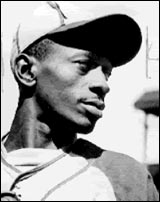 control of the facility for four days to demonstrate against squalid living conditions. When negotiations broke down state troopers and prison officers opened fire killing
control of the facility for four days to demonstrate against squalid living conditions. When negotiations broke down state troopers and prison officers opened fire killing 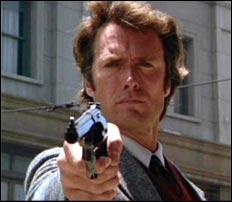 29 inmates and 10 of the hostages. A coup brought Idi Amin to power in Uganda. Haitian dictator "Papa Doc" Duvalier died. Satchel Paige was inducted into the Baseball Hall of Fame, the first black player to be selected. Clint Eastwood brought Dirty Harry to the screen. The French Connection won the Oscar for best picture. Carole King won four Grammys for her album "Tapestry". John Lennon released Imagine. George Harrison and Ravi Shankar organized and fronted a Concert for Bangladesh at Madison Square Garden in New York City. It was the first of its kind. In Toronto, the provincial government cancelled the controversial Spadina Expressway project. In Switzerland, women were granted the right to vote. A barrier collapsed at a soccer match in Glasgow killing 66 at Ibrox Park. A group of activists set sail from Vancouver in an old fishing boat to protest nuclear testing at Amchita, a small island off the coast of Alaska. It's the beginning of Greenpeace. Detroit hockey star Gordie Howe retired after 25 seasons with the club (he'd be back in hockey in 1973 to play with his sons Marty and Mark in the World Hockey Association).
29 inmates and 10 of the hostages. A coup brought Idi Amin to power in Uganda. Haitian dictator "Papa Doc" Duvalier died. Satchel Paige was inducted into the Baseball Hall of Fame, the first black player to be selected. Clint Eastwood brought Dirty Harry to the screen. The French Connection won the Oscar for best picture. Carole King won four Grammys for her album "Tapestry". John Lennon released Imagine. George Harrison and Ravi Shankar organized and fronted a Concert for Bangladesh at Madison Square Garden in New York City. It was the first of its kind. In Toronto, the provincial government cancelled the controversial Spadina Expressway project. In Switzerland, women were granted the right to vote. A barrier collapsed at a soccer match in Glasgow killing 66 at Ibrox Park. A group of activists set sail from Vancouver in an old fishing boat to protest nuclear testing at Amchita, a small island off the coast of Alaska. It's the beginning of Greenpeace. Detroit hockey star Gordie Howe retired after 25 seasons with the club (he'd be back in hockey in 1973 to play with his sons Marty and Mark in the World Hockey Association).
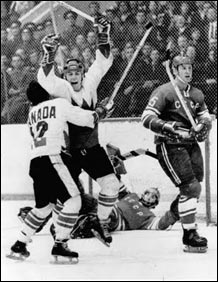 1972 - "Here's another shot. Right in front. They score! Henderson has scored for Canada!" Foster Hewitt's call, one of the most memorable in Canadian sports history, set off wild celebrations across the land as Canada defeated the Soviet Union in hockey's Summit Series. The goal with just 34 seconds remaining in the final game of the 8-game set, made Paul Henderson a national hero. Richard Nixon became the first U.S. president to visit China. Activists Tom Hayden and Jane Fonda stepped up the anti-war campaign with a 25-city tour. Fonda was given the handle "Hanoi Jane" after a trip to North Vietnam and continued criticism of American involvement in the war. In Washington, arrests were made in connection with a burglary in the Democratic National Committee offices at the Watergate complex. Two years later, President Nixon
1972 - "Here's another shot. Right in front. They score! Henderson has scored for Canada!" Foster Hewitt's call, one of the most memorable in Canadian sports history, set off wild celebrations across the land as Canada defeated the Soviet Union in hockey's Summit Series. The goal with just 34 seconds remaining in the final game of the 8-game set, made Paul Henderson a national hero. Richard Nixon became the first U.S. president to visit China. Activists Tom Hayden and Jane Fonda stepped up the anti-war campaign with a 25-city tour. Fonda was given the handle "Hanoi Jane" after a trip to North Vietnam and continued criticism of American involvement in the war. In Washington, arrests were made in connection with a burglary in the Democratic National Committee offices at the Watergate complex. Two years later, President Nixon 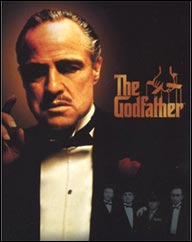 would be forced to resign. Atari released Pong, the electronic ping-pong game which kick-started the video game industry. Canada's communications satellite, Anik-1, was launched from Cape Canaveral. In what became known as Bloody Sunday 13 unarmed Catholic protesters were shot and killed by British troops in Northern Ireland. Eleven Israeli athletes were murdered by a Palestinian terrorist group at the Olympics in Munch. A terrorist attack at Tel Aviv's Lod Airport killed 26 people and injured 80 others. Sandy Koufax, Yogi Berra and Early Wynn were inducted into baseball's Hall of Fame. Major league baseball had its first players' strike. It lasted 13 days. The NHL had competition. The World Hockey Association began play with 12 teams and one big star, Bobby Hull. Gordie Howe and Jean Beliveau were inducted in the Hockey Hall of Fame. M*A*S*H* had its premiere on NBC-TV. In the Match of the Century, Bobby Fischer of the USA beat Boris Spassky of the USSR for the world chess title. Hollywood classic, The Godfather, with Marlon Brando, had its debut. It would win the Oscar for best picture and best actor. Among the top singles were Don McLean's American Pie, Heart of Gold (Neil Young) and Candy Man (Sammy Davis Jr.). Most popular fiction - Jonathan Livingston Seagull (Richard Bach), August, 1914 (Alexander Solzhenitsyn) and The Winds of War (Herman Wouk). The top non-fiction books included I'm O.K., You're O.K. (Thomas Harris) and Dr. Atkins' Diet Revolution (Robert C. Atkins). All in the Family was the big show on television, along with Sanford and Son, Hawaii Five-O and Maude.
would be forced to resign. Atari released Pong, the electronic ping-pong game which kick-started the video game industry. Canada's communications satellite, Anik-1, was launched from Cape Canaveral. In what became known as Bloody Sunday 13 unarmed Catholic protesters were shot and killed by British troops in Northern Ireland. Eleven Israeli athletes were murdered by a Palestinian terrorist group at the Olympics in Munch. A terrorist attack at Tel Aviv's Lod Airport killed 26 people and injured 80 others. Sandy Koufax, Yogi Berra and Early Wynn were inducted into baseball's Hall of Fame. Major league baseball had its first players' strike. It lasted 13 days. The NHL had competition. The World Hockey Association began play with 12 teams and one big star, Bobby Hull. Gordie Howe and Jean Beliveau were inducted in the Hockey Hall of Fame. M*A*S*H* had its premiere on NBC-TV. In the Match of the Century, Bobby Fischer of the USA beat Boris Spassky of the USSR for the world chess title. Hollywood classic, The Godfather, with Marlon Brando, had its debut. It would win the Oscar for best picture and best actor. Among the top singles were Don McLean's American Pie, Heart of Gold (Neil Young) and Candy Man (Sammy Davis Jr.). Most popular fiction - Jonathan Livingston Seagull (Richard Bach), August, 1914 (Alexander Solzhenitsyn) and The Winds of War (Herman Wouk). The top non-fiction books included I'm O.K., You're O.K. (Thomas Harris) and Dr. Atkins' Diet Revolution (Robert C. Atkins). All in the Family was the big show on television, along with Sanford and Son, Hawaii Five-O and Maude.
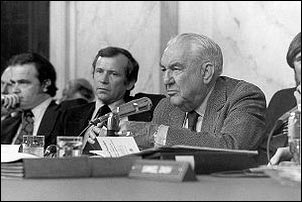 1973 brought the Paris Peace Accords and an end to American involvement in the war in Vietnam. A special committee of the U.S. Senate, chaired by Sam Ervin, began hearings into the Watergate scandal. It led to the conviction of several Nixon aides and pressure on President Nixon to resign, under the threat of impeachment. The televised hearings became a daily staple for tens of millions of viewers. A group, headed by George Steinbrenner, purchased the New York Yankees for $10-million. Dick Allen signed a three-year-contract for an estimated $250,000, believed to be the highest salary in major league history. In a landmark decision on abortion, the U.S. Supreme Court ruled, in Roe v. Wade, that a woman's right to choose abortion was protected by the Constitution. Arab nations launched a surprise attack on Israel in the Yom Kippur
1973 brought the Paris Peace Accords and an end to American involvement in the war in Vietnam. A special committee of the U.S. Senate, chaired by Sam Ervin, began hearings into the Watergate scandal. It led to the conviction of several Nixon aides and pressure on President Nixon to resign, under the threat of impeachment. The televised hearings became a daily staple for tens of millions of viewers. A group, headed by George Steinbrenner, purchased the New York Yankees for $10-million. Dick Allen signed a three-year-contract for an estimated $250,000, believed to be the highest salary in major league history. In a landmark decision on abortion, the U.S. Supreme Court ruled, in Roe v. Wade, that a woman's right to choose abortion was protected by the Constitution. Arab nations launched a surprise attack on Israel in the Yom Kippur 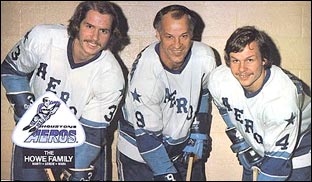 War (it began on the Day of Atonement - Yom Kippur - the holiest day in the Jewish calendar). Initially overwhelmed, Israeli forces quickly gained the upper hand. Chile's military staged a coup to oust President Allende. Under criminal investigation for graft, while in public office in Maryland, Spiro Agnew resigned as Vice-President of the U.S. Gerald Ford was sworn in as his replacement. Carly Simon's "You're So Vain" topped the music charts. "The Sting", with Paul Newman and Robert Redford, was among the year's leading movies, winning the Oscar as Best Picture. Gordie Howe came out of retirement and, at age 45, joined the Houston Aeros of the World Hockey Association to play on the same club with his sons Marty and Mark. He suited up for seven more seasons, including the 1979-80 winter back in the NHL. Boston's Phil Espositio won the scoring title for the third straight year. Bobby Clarke of Philadelphia was selected as the most valuable player. Reggie Jackson of the Oakland A's was the MVP of the American League and of the World Series when the A's defeated the Mets.
War (it began on the Day of Atonement - Yom Kippur - the holiest day in the Jewish calendar). Initially overwhelmed, Israeli forces quickly gained the upper hand. Chile's military staged a coup to oust President Allende. Under criminal investigation for graft, while in public office in Maryland, Spiro Agnew resigned as Vice-President of the U.S. Gerald Ford was sworn in as his replacement. Carly Simon's "You're So Vain" topped the music charts. "The Sting", with Paul Newman and Robert Redford, was among the year's leading movies, winning the Oscar as Best Picture. Gordie Howe came out of retirement and, at age 45, joined the Houston Aeros of the World Hockey Association to play on the same club with his sons Marty and Mark. He suited up for seven more seasons, including the 1979-80 winter back in the NHL. Boston's Phil Espositio won the scoring title for the third straight year. Bobby Clarke of Philadelphia was selected as the most valuable player. Reggie Jackson of the Oakland A's was the MVP of the American League and of the World Series when the A's defeated the Mets.
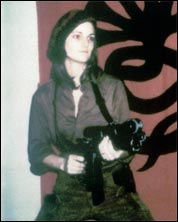 1974 Patty Hearst was kidnapped by the Symbionese Liberation Army. The Soviet Union deported Alexander Solzhenitsyn following publication of his book "The Gulag Archipelago". Karen Silkwood was killed in a mysterious automobile accident on the way to a meeting to reveal safety violations at a nuclear plant near Oklahoma City. In the 1983 movie, Meryl Streep played the role of Silkwood. Cass Elliot, of the Mamas and Papas, died of a heart attack. In an historic boxing match, Muhammad Ali defeated George Foreman for the heavyweight title in the Rumble in the Jungle in Kinshasa, Zaire. Dr. Henry Morgentaler was acquitted on charges of performing illegal abortions. The acquittal was later overturned and Morgentaler spent 10 months in prison before an appeal resulted in another acquittal. On August 9, in the face of probable impeachment for his role in the Watergate scandal, President Nixon resigned, the first U.S. president to do so. Vice-President Gerald Ford assumed the presidency. Haile Selaissie was deposed as Emperor
1974 Patty Hearst was kidnapped by the Symbionese Liberation Army. The Soviet Union deported Alexander Solzhenitsyn following publication of his book "The Gulag Archipelago". Karen Silkwood was killed in a mysterious automobile accident on the way to a meeting to reveal safety violations at a nuclear plant near Oklahoma City. In the 1983 movie, Meryl Streep played the role of Silkwood. Cass Elliot, of the Mamas and Papas, died of a heart attack. In an historic boxing match, Muhammad Ali defeated George Foreman for the heavyweight title in the Rumble in the Jungle in Kinshasa, Zaire. Dr. Henry Morgentaler was acquitted on charges of performing illegal abortions. The acquittal was later overturned and Morgentaler spent 10 months in prison before an appeal resulted in another acquittal. On August 9, in the face of probable impeachment for his role in the Watergate scandal, President Nixon resigned, the first U.S. president to do so. Vice-President Gerald Ford assumed the presidency. Haile Selaissie was deposed as Emperor 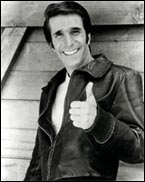 of Ethiopia. The top books in the fiction section included, "Centennial" by James Michener, "Watership Down" (Richard Adams) and "Jaws" (Pete Benchley). "Happy Days" began its run on ABC. Mickey Mantle and Whitey Ford of the Yankees elected to the Hall of Fame. The first of Ted Bundy's victims, Lynda Ann Healy, was abducted in Seattle. Hockey star Tim Horton, of the Toronto Maple Leafs, died in a car crash. Baseball's Dizzy Dean died. Other
of Ethiopia. The top books in the fiction section included, "Centennial" by James Michener, "Watership Down" (Richard Adams) and "Jaws" (Pete Benchley). "Happy Days" began its run on ABC. Mickey Mantle and Whitey Ford of the Yankees elected to the Hall of Fame. The first of Ted Bundy's victims, Lynda Ann Healy, was abducted in Seattle. Hockey star Tim Horton, of the Toronto Maple Leafs, died in a car crash. Baseball's Dizzy Dean died. Other 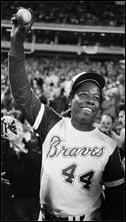 passings included fabled jazz musician Duke Ellington, TV host Ed Sullivan, and comedian Jack Benny. Mikhail Baryshnikov, the Russian ballet dancer, defected in Toronto. At the Grammy Awards, Roberta Flack won the best song category for “Killing Me Softly”. Stevie Wonder took home five awards, including one for "You Are The Sunshine of My Life". In the U.S., the rate for a 1st Class postage stamp rose to 10-cents. Hank Aaron of the Atlanta Braves cracked a home run, the 715th of his career, to break Babe Ruth's record. Golda Meir stepped down as Prime Minister of Israel. More than 300 people in the United States and Canada were killed in a series of 148 tornadoes which struck an area from Mississippi, Alabama and Georgia up to Windsor, Ontario. President Ford announced a conditional amnesty program for Vietnam War deserters and draft-dodgers. Concern about the ozone layer, and increased risks of skin cancers, became a focus as scientists warned against the use of aerosol sprays. In Boston a scheme to force the integration of schools, through busing, brought racial violence and a call to the National Guard to restore order. In November, after a year of bombings and other violence, 21 civilians were killed by IRA bombs at two pubs in Birmingham, England.
passings included fabled jazz musician Duke Ellington, TV host Ed Sullivan, and comedian Jack Benny. Mikhail Baryshnikov, the Russian ballet dancer, defected in Toronto. At the Grammy Awards, Roberta Flack won the best song category for “Killing Me Softly”. Stevie Wonder took home five awards, including one for "You Are The Sunshine of My Life". In the U.S., the rate for a 1st Class postage stamp rose to 10-cents. Hank Aaron of the Atlanta Braves cracked a home run, the 715th of his career, to break Babe Ruth's record. Golda Meir stepped down as Prime Minister of Israel. More than 300 people in the United States and Canada were killed in a series of 148 tornadoes which struck an area from Mississippi, Alabama and Georgia up to Windsor, Ontario. President Ford announced a conditional amnesty program for Vietnam War deserters and draft-dodgers. Concern about the ozone layer, and increased risks of skin cancers, became a focus as scientists warned against the use of aerosol sprays. In Boston a scheme to force the integration of schools, through busing, brought racial violence and a call to the National Guard to restore order. In November, after a year of bombings and other violence, 21 civilians were killed by IRA bombs at two pubs in Birmingham, England.
1975
And, a couple of highlights from the mid-70s. In 1975, Bill Gates, 19, and Paul Allen, 22, wrote the first of their computer operating programs in a partnership that would become Microsoft and program that would evolve into Windows. A year later, Steve Wozniak and Steve Jobs would finish work on a personal computer they called the Apple 1.
